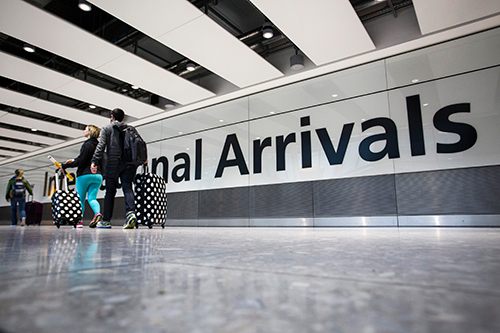During the COVID-19 pandemic, EU Member States took various measures to restrict travel in order to limit the spread of coronavirus. To ensure coordination and clear communication across the EU, the Commission worked on fostering cooperation and exchange of information regarding such restrictions.
On 13 October 2020, on the basis of a Commission proposal, the Council adopted a Recommendation on a coordinated approach to the restriction of free movement in response to the COVID-19 pandemic. The recommendation aimed to avoid fragmentation and disruption, and to increase transparency and predictability for citizens and businesses. More specifically, it established a common approach on the following key points:
-
The application of common criteria and thresholds when deciding whether to introduce travel restrictions
-
Mapping of the risk areas of COVID-19 transmission based on common conditions and an agreed colour code, published by the European Centre for Disease Prevention and Control
-
A common framework for measures applied to travellers from high-risk areas
-
Coordination among Member States and clear and timely information to the public about any restrictions
The Council recommendation was updated multiple times in response to the developments of the pandemic. This included establishing standard validity periods for tests of COVID-19 infection.
Another important tool to facilitate safe travel within the EU, was the EU Digital COVID Certificate Regulation, which entered into force on 1 July 2021. The Certificate served as proof that a person was vaccinated against COVID-19, had recently received a negative test result or recovered from COVID-19. When travelling, every Certificate holder would have the same rights as citizens of the visited Member State who were vaccinated, tested or recovered from COVID-19. As such, the regulation aimed at facilitating the gradual lifting of travel restrictions put in place by the Member States.
Used by most Member States from its launch in 2021 until mid-2022, the EU Digital COVID Certificate was a major success in Europe’s efforts to address and mitigate the impact of the COVID-19 pandemic on societies and economies. With more than 2.3 billion certificates issued, it was crucial to support free movement and Europe’s hard-hit tourism industry. As the epidemiological situation improved, requirements to hold EU Digital COVID Certificates for intra-EU travel decreased. On 29 June 2022, to ensure continued travel in the case of a significant worsening of the epidemiological situation, the EU Digital COVID Certificate Regulation was extended until 30 June 2023. By August 2022, all Member States had lifted all intra-EU travel restrictions.
On 5 May 2023, the World Health Organization declared the end of the COVID-19 pandemic as a public health emergency of international concern. Reflecting this situation, the Commission did not propose a further extension of the EU Digital COVID Certificate Regulation beyond 30 June 2023. Since 1 July 2023, the regulation and accompanying Council recommendation are no longer in force.
The positive impact of the EU Digital COVID Certificate system extended beyond the EU, as it became a global standard firmly based on the EU’s values of openness, security and data protection. Overall, 78 countries across five continents benefited from the system. This success contributed to the resumption of safe international travel and global recovery. The World Health Organization has decided to take up the EU system of digital COVID-19 certification to establish a global system that will help protect citizens across the world from on-going and future health threats, including pandemics.
For more information about the possible future use of the underlying technology, see EU Digital COVID Certificate.

